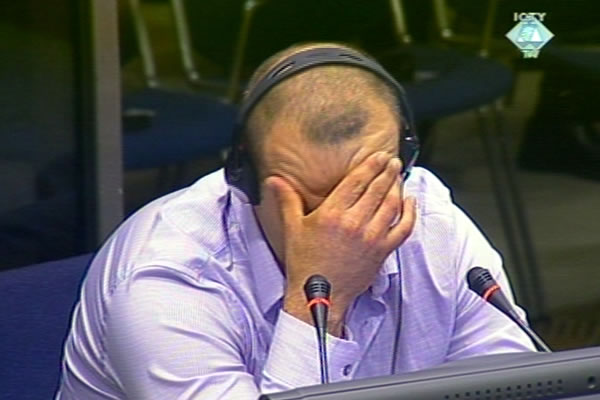Home
FIGHT TO ADMIT KABASHI'S PREVIOUS TESTIMONY
The prosecution wants Shefqet Kabashi's evidence at the Limaj et al. trial to be admitted into evidence at the trial of former KLA commanders Haradinaj, Balaj and Brahimaj. The defense is opposed. In his testimony in March 2005, Kabashi described the crimes against the prisoners in the Jablanica camp
 Shefqet Kabashi, witness at the Haradinaj, Balaj and Lahi Brahimaj trial
Shefqet Kabashi, witness at the Haradinaj, Balaj and Lahi Brahimaj trial Obviously aware that former KLA soldier Shefqet Kabashi will not agree to testify about the crimes in the Jablanica camp at the trial of Ramush Haradinaj, Idriz Balaj and Lahi Brahimaj, prosecutor Paul Rogers today sought an alternative solution. He sought to have the transcript of Kabashi's testimony from the Limaj et al. trial admitted into evidence.
Kabashi testified against Limaj and others in March 2005 and said that he saw a handful of Albanian and Roma prisoners in the camp in the spring and summer of 1998. He said that in May 1998, he saw two Roma men brought into Jablanica, with their hands tied. They were detained in the camp. Lahi Brahimaj ordered them to be 'sent to Drenica'; this was code for killing people. Two Kosovo Albanians were also 'sent to Drenica' a while later: Skender Kuqi and Pal Krasniqi. Kabashi mentioned them too. As he said, he spoke with Pal Krasniqi, who told him he had been charged with 'espionage' and had been beaten until he admitted he had been 'sent by a Serb inspector from Pec to join the KLA as a volunteer'. Kabashi claims he doesn’t know what happened to Krasniqi later; he heard that Kuqi had been killed and buried near the Jablanica camp. His body was later moved to Rznic.
Yesterday, Kabashi refused to repeat his earlier claims about the Jablanica crimes, and prosecutor Rogers asked him several times if he had been truthful at the Limaj et al. trial. The witness at first tried to evade answering the question, saying, 'I don't know what to say', that he “couldn't recall” what he had said in 2005, and that he did 'not want to say something that will cost me dearly'. In the end he did imply that his earlier testimony was truthful. 'I was probably striving to tell the truth, because I'm not in the habit of lying', Kabashi said.
This answer as well as parts of the witness's testimony yesterday in which he said he accepted his testimony from 2005 prompted the prosecutor to seek the admission of the transcript into evidence. 'The fact that he does not recall now', the prosecutor said, 'does not mean that his evidence in 2005 is unreliable'. According to the prosecution, there are grounds for the admission of the transcript because yesterday and today the witness did not recant his previous evidence; what he said was that now, after six years, he was unable to recall. The prosecutor invoked a rule which stipulates that 'the Chamber may admit any relevant evidence it deems to have probative value'.
The defense, on the other hand, considers that previous testimony cannot be admitted unless the witnesses have expressly confirmed the accuracy and truthfulness of those documents. As the parties argued back and forth about the admissibility of Kabashi's testimony, they picked and chose parts of his evidence yesterday and today in support of their arguments. As the defense noted, Kabashi said he could not confirm the claims he made at the Limaj et al. trial and the prosecution argued that Kabashi did say several times he had been telling the truth in 2005.
After the Chamber heard the parties, the judges ended the hearing. The decision which could affect Kabashi and his evidence and the trial as a whole will be delivered in due course.
Linked Reports
- Case : Haradinaj et al.
- 2011-08-22 WHY WON'T KABASHI TESTIFY AGAINST HARADNAJ AND OTHERS
- 2011-08-19 SHEFQET KABASHI’S EVIDENCE POSTPONED FOR MONDAY
- 2011-08-18 PROSECUTION CONVINCED RAMUSH HARADINAJ IS GUILTY, DEFENSE CLAIMS HE IS INNOCENT
- 2011-08-24 TRANSCRIPT OF TESTIMONY ABOUT JABLANICA CRIMES ADMITTED INTO EVIDENCE AT HARADINAJ ET AL. TRIAL
- 2011-08-25 BLACKMAIL USED TO OBTAIN INTELLIGENCE ON KLA
- 2011-08-26 DID HARADINAJ CONTROL KLA CAMP IN JABLANICA?
